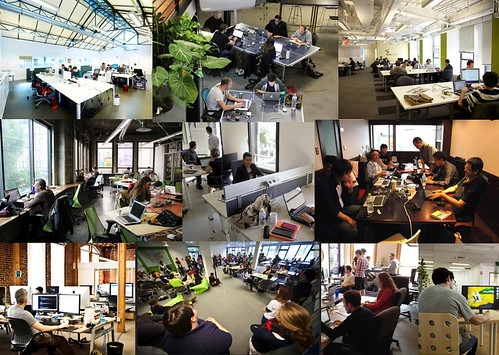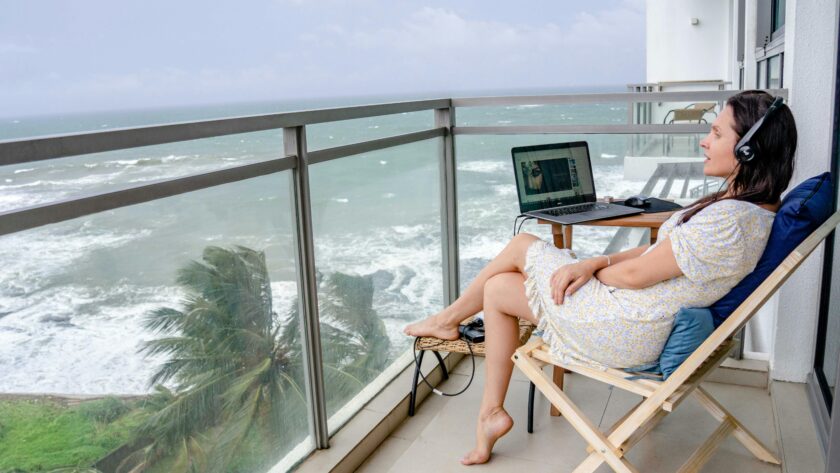Introduction: The Rise of Remote Work and Digital Nomads
Over the last decade, remote work has undergone a significant transformation. Once a rarity, the concept of working from anywhere has become an integral part of the modern professional landscape. Technological advancements in communication tools, project management software, and cloud services have made it increasingly feasible to work remotely. Moreover, the global COVID-19 pandemic has further accelerated this shift, forcing businesses worldwide to adapt to remote operations. As a result, many professionals have embraced a newfound freedom—becoming digital nomads who seamlessly blend work with travel.
This emergent lifestyle has given rise to a new demographic of workers who prioritize flexibility and mobility. Digital nomads take advantage of their location-independent roles to explore different cultures and environments while maintaining their professional responsibilities. However, to fully embrace this lifestyle, digital nomads require specific amenities and infrastructure. Vital elements for a digital nomad-friendly destination include reliable high-speed internet, coworking spaces, affordable living costs, and a supportive community of like-minded individuals.
As this trend continues to grow, cities and countries around the world are recognizing the economic potential digital nomads bring. Many have started to develop policies and infrastructural support specifically targeting these itinerant workers. From offering digital nomad visas to improving local internet bandwidth, destinations are vying to become the next remote work hub. The shift towards remote work and the rise of digital nomads reflect an evolving professional culture that values work-life balance and geographical independence, setting the stage for a dynamic future in global work trends.
Why Choose a Digital Nomad Lifestyle?

In today’s interconnected world, the digital nomad lifestyle is becoming an increasingly popular choice for individuals looking to blend work and travel. One of the most significant advantages of this lifestyle is the enhanced flexibility it offers. Digital nomads can work from anywhere with an internet connection, allowing them to design their work schedule to fit their personal preferences and travel plans. Whether it’s working from a beachfront cafe in Bali or a mountain cabin in the Alps, the possibilities are limitless.
Another notable benefit of being a digital nomad is the opportunity for enhanced creativity. Changing one’s environment regularly can provide fresh perspectives and inspire innovative ideas, which can be particularly beneficial for those in creative or problem-solving professions. Additionally, experiencing diverse cultures can broaden one’s horizons and foster a more comprehensive understanding of the world.
Moreover, the digital nomad lifestyle can significantly improve work-life balance. By choosing their working hours and locations, digital nomads can better manage their time between professional responsibilities and personal interests. This dynamic can lead to increased job satisfaction and overall well-being.
However, this lifestyle also comes with its own set of challenges. One of the most common difficulties is managing time zone differences, which can complicate communication and collaboration with colleagues and clients in other parts of the world. Furthermore, maintaining work discipline in an ever-changing environment requires a high level of self-motivation and organizational skills. It is essential for digital nomads to establish routines and set clear boundaries to ensure productivity.
Despite these challenges, many digital nomads find that the benefits far outweigh the drawbacks. Living as a digital nomad provides a unique opportunity to explore the world, gain new experiences, and grow both personally and professionally. By overcoming the hurdles associated with this lifestyle, individuals can enjoy a more enriching and fulfilling way of life.
Key Factors to Consider When Choosing a Remote Work Destination

As the landscape of work continues to evolve, digital nomads are seeking destinations that not only satisfy their professional requirements but also enhance their lifestyle. Selecting the ideal remote work location involves evaluating several critical factors to ensure a productive and enriching experience.
First and foremost, reliable high-speed internet is a non-negotiable requirement for remote work. A dependable internet connection enables seamless communication, efficient project management, and uninterrupted access to essential online tools and resources. Ensure that your chosen destination offers robust internet infrastructure before making a move.
Affordability and cost of living are also pivotal considerations. Understanding the financial implications associated with living in a new country or city can impact your budget and overall quality of life. Factor in accommodation costs, food prices, transportation expenses, and any other daily expenditures to gain a comprehensive view of the financial landscape.
Safety is a paramount concern for digital nomads. Researching the local crime rates, political stability, and health risks can provide insights into the security of a potential destination. Prioritize locations with a lower crime index and good governance to ensure a safe working environment.
Healthcare accessibility is another crucial aspect. Ensure that the destination provides quality healthcare services, including hospitals and clinics, and consider whether these facilities are covered by your insurance plan. This will provide peace of mind and maintain your well-being during your stay.
The availability of coworking spaces can significantly enhance your remote work experience. These spaces offer modern amenities, networking opportunities, and a professional working environment. Popular digital nomad hubs often have numerous coworking spaces that cater to diverse needs and preferences.
Community and networking opportunities are vital for personal and professional growth. Engaging with a community of like-minded individuals can foster collaborations, inspire creativity, and provide emotional support. Look for destinations known for their vibrant digital nomad communities where you can connect and thrive.
Lastly, the overall quality of life, which includes climate, local culture, and recreational activities, plays a significant role. A favorable climate can enhance your daily experiences, while rich cultural offerings and accessible recreational activities can make your stay enjoyable and fulfilling.
By carefully considering these factors, digital nomads can select a remote work destination that aligns with their professional goals and personal preferences, ensuring a balanced and gratifying lifestyle.
Bali
Bali has long been a favorite among digital nomads due to its vibrant culture, stunning landscapes, and affordable cost of living. Notably, the island provides a variety of coworking spaces such as Dojo Bali and Outpost, catering specifically to the needs of remote workers with strong internet connections and community events. For those planning a longer stay, a social-cultural visa can be extended up to six months. The cost of living varies depending on lifestyle, but on average, digital nomads find Bali to be quite budget-friendly, often spending between $1,000-$1,500 per month.
Chiang Mai
Chiang Mai offers digital nomads a unique blend of affordability and quality of life. This northern Thai city is known for its friendly locals, historic temples, and bustling markets. Coworking spaces like Punspace and CAMP are popular among remote workers, providing reliable internet and comfortable work environments. Visa solutions, such as the Thai Education Visa, allow nomads to stay for extended periods. Overall, the cost of living in Chiang Mai is relatively low, with monthly expenses around $800-$1,200, making it an enticing option for those seeking a balance between work and leisure.
Lisbon
Lisbon, the capital of Portugal, has rapidly emerged as a premier destination for digital nomads. The city’s historical charm, pleasant weather, and robust digital infrastructure are significant draws. Remote workers have access to numerous coworking spaces, including Second Home and Cowork Central. Lisbon also offers a Digital Nomad Visa, allowing remote professionals to stay and work legally. While Lisbon is costlier compared to Asian counterparts, it remains affordable by European standards, with monthly expenses ranging from $1,500-$2,500.
Medellín
Medellín, known as the “City of Eternal Spring” due to its year-round temperate climate, is gaining popularity among digital nomads. The city’s transformation into a vibrant hub with modern amenities makes it an attractive remote work destination. Coworking spaces such as Selina and Atomhouse cater to the digital workforce. The Colombian tourist visa can be extended, offering flexibility for longer stays. With a cost of living between $1,000-$1,400 per month, Medellín offers a blend of affordability and quality urban living.
Prague
Prague’s rich history, architectural beauty, and thriving expat community make it a top choice for digital nomads. The city features a variety of coworking spaces like K10 Coworking and Impact Hub Prague, ensuring reliable internet and networking opportunities. For visa requirements, the Czech Republic offers a long-term visa option. While living costs in Prague are moderate by European standards, digital nomads can expect monthly expenses ranging from $1,200-$2,000. This combination of cultural richness and modern amenities makes Prague a compelling destination for remote workers.
Spotlight on Coworking Spaces: Where to Get Work Done

Coworking spaces have ascended as an essential pillar for digital nomads, providing more than just a physical location to work. These environments foster networking opportunities, community building, and a professional atmosphere conducive to productivity. With remote work becoming increasingly popular, coworking spaces around the globe have tailored their amenities to meet the diverse needs of digital nomads, making them a vital consideration when choosing a remote work destination.
One of the top coworking spaces is WeWork, which has locations worldwide from New York to Bali. The global footprint of WeWork offers unparalleled flexibility for digital nomads. It’s known for its comprehensive amenities, including high-speed internet, private offices, communal areas, and event spaces. Membership costs vary, but they typically start around $300 per month. The community-centric environment fosters collaboration, with frequent networking events and workshops that can benefit digital nomads looking to connect with like-minded professionals.
In Southeast Asia, Hubud in Bali stands out. Often regarded as a haven for digital nomads, Hubud offers an open-air working environment with a strong sense of community, thanks to its regular social and professional events. The lush, tropical setting enhances the work experience, and low membership fees—starting at $20 for a day pass—make it an affordable choice for many. Unique amenities include a bamboo workspace, weekly yoga classes, and an on-site organic café, making it a holistic work option for those prioritizing wellbeing alongside productivity.
Europe hosts some renowned coworking spaces like Impact Hub in Lisbon. Known for its vibrant community, Impact Hub offers more than just a desk; it provides access to a network of entrepreneurs and innovators. Membership fees are competitive, starting at approximately €120 per month, and the space includes high-speed internet, meeting rooms, and a rooftop terrace. Being located in a bustling city like Lisbon, it pairs the perks of urban living with a serene workspace.
In the Americas, Selina in Medellín, Colombia, offers a unique blend of coworking space and co-living. This makes it particularly attractive for digital nomads seeking both accommodation and a place to work. Starting around $150 per month for coworking and additional fees for accommodation, Selina provides flexible plans that cater to varying needs. The space is equipped with modern amenities, including private workspaces, a rooftop area, and community events, ensuring that digital nomads can work efficiently and network effortlessly.
In summary, selecting the right coworking space involves considering not only the cost but also the specific amenities and community it offers. The best spaces, like WeWork, Hubud, Impact Hub, and Selina, go beyond providing a desk and internet; they foster an environment where digital nomads can thrive both professionally and personally.
Managing Long-term Stays: Accommodation Options

For digital nomads, selecting the right long-term accommodation is crucial for maintaining productivity and enjoyment. Among the most viable options are renting apartments, co-living spaces, and extended-stay hotels, each catering to different preferences and needs.
Renting apartments offers privacy and the freedom to create a personalized working environment. Popular platforms like Airbnb and Zillow facilitate finding furnished apartments. When considering this option, it’s beneficial to negotiate a long-term lease, which can result in significant discounts. Moreover, always verify that the chosen apartment has reliable internet and a suitable workspace, as these are vital for ensuring seamless remote work.
Co-living spaces present a unique blend of community and convenience, often tailored to digital nomads. Companies such as Selina and Outsite provide all-inclusive packages that cover utilities, cleaning services, and communal activities, fostering both productivity and social interaction. These spaces typically feature high-speed internet, designated work areas, and networking opportunities, making them an attractive option for those seeking a dynamic yet stable living arrangement.
Extended-stay hotels are another attractive choice, especially for those who prefer the amenities of a hotel while staying for a longer period. Brands like Marriott Executive Apartments and Staybridge Suites offer discounted rates for long-term guests, along with facilities such as business centers and reliable Wi-Fi. These hotels often provide the added conveniences of housekeeping and on-site dining options, perfect for those who value comfort and ease.
When scouting for the best deals, it’s advantageous to start the search early and utilize niche websites that cater to extended stays. Negotiating directly with property owners can lead to better rates and more flexible terms. Additionally, engaging in local community forums can provide insider tips and personal recommendations, thus ensuring the living space meets all professional needs, including a stable internet connection and work-friendly environments.
Balancing Work and Travel: Tips and Best Practices

Digital nomads often face the challenge of balancing their professional commitments with the lure of new and exciting destinations. Achieving this balance requires a strategic approach, starting with setting up a daily routine. Establishing consistent work hours helps maintain productivity and ensures that tasks are completed efficiently. While flexibility is a perk of remote work, having a structured schedule can prevent work from spilling into personal time.
Managing different time zones is another critical aspect of maintaining productivity while traveling. Use time zone management tools to keep track of meeting schedules and deadlines. Communicate with your team and clients proactively about your location and available hours. This transparency helps set expectations and avoids any confusion or missed opportunities.
Digital tools can significantly enhance productivity for remote workers. Leverage platforms like Asana, Trello, or Monday.com for task management, Slack or Microsoft Teams for communication, and Zoom or Google Meet for virtual meetings. These tools help streamline workflow, maintain organization, and foster collaboration, regardless of where you are in the world.
Striking a healthy work-life balance is essential for mental and physical well-being. Schedule downtime to explore your new environment and immerse yourself in the local culture. This not only enriches your experience but also prevents burnout. Setting boundaries is crucial: designate a specific workspace and communicate your work hours clearly to friends and travel companions. This not only helps in minimizing interruptions but also in maintaining a clear division between work and leisure time.
Finally, prioritize self-care by incorporating breaks, exercise, and time for relaxation into your daily routine. Remember that the essence of being a digital nomad is to enjoy the freedom that remote work offers while still fulfilling professional responsibilities. By implementing these best practices, you can thrive both professionally and personally in your remote work journey.
Building a Remote Work Community: Networking and Socializing

As the trend of remote work continues to expand, establishing a solid support system through networking and socializing has become essential for digital nomads. Building a remote work community is not just about finding like-minded individuals; it is about creating a network that can provide professional support, collaboration opportunities, and a sense of belonging while navigating various countries and cultures.
One of the first steps in building such a community is to locate local digital nomad groups. Cities recognized as top destinations for remote work often have thriving digital nomad communities. Platforms like Meetup, Facebook Groups, and specialized apps such as Nomad List or Internations can be valuable resources to find and join these groups. Attending these meetups and events can foster connections with other remote workers, allowing you to share experiences, knowledge, and even project collaborations.
Additionally, participating in coworking spaces can be an excellent way to build relationships and network. Many coworking spaces host regular events, workshops, and social gatherings that provide opportunities for learning, skill-sharing, and networking. Popular coworking spaces often attract a diverse group of professionals, making them a fertile ground for building professional relationships and friendships.
Utilizing online platforms to connect with other remote workers also proves to be effective. Websites and forums such as Reddit, Slack communities, and LinkedIn offer virtual spaces where remote workers can share advice, post job opportunities, and seek collaboration. Virtual coffee chats or video calls can also turn digital connections into more personal relationships, bridging the gap when physical meetups are not possible.
Ultimately, forging a strong remote work community offers numerous benefits. It ensures you have a support system, helps in exchanging innovative ideas, mitigates feelings of isolation, and enhances your overall remote work experience. By proactively taking steps to network and socialize, you can make the most of your journey as a digital nomad, turning it into a fulfilling and professionally enriching adventure.
Conclusion: Embracing the Digital Nomad Lifestyle

The allure of the digital nomad lifestyle continues to captivate professionals from diverse fields, offering a unique blend of work flexibility and cultural immersion. In our exploration of top remote work destinations for digital nomads, we delved into cities that provide not only robust digital infrastructure and affordable living but also vibrant communities and enriching experiences.
From the technological haven of Tallinn to the paradisiacal beaches of Bali, each highlighted destination promises to cater to varying preferences and professional needs. The burgeoning digital nomad hubs in Barcelona and Lisbon offer a mix of historical charm and modern amenities, while bustling urban centers like Bangkok and Mexico City provide endless opportunities for discovery and personal growth. It’s apparent that the world is brimming with possibilities for those willing to transcend the conventional office setup.
The benefits of adopting the digital nomad lifestyle are manifold. Alongside the freedom to choose your surroundings, there’s the undeniable joy of forming connections across cultures and forging a path that’s uniquely yours. Moreover, the supportive ecosystems that many cities have developed—complete with co-working spaces, networking events, and local digital nomad communities—make it easier than ever to thrive professionally and personally while on the move.
If you’ve been contemplating this lifestyle, now is an opportune moment to take the plunge. Whether you’re a seasoned traveler or a newly remote worker, these destinations offer a wealth of opportunities to enhance your journey. Prepare diligently, leverage the tips shared throughout this post, and embark on an adventure that unites work and wanderlust.
We encourage you to reflect on your goals and define what you seek in a remote work destination. As you plan your next steps, consider the cities and tips we’ve discussed, and envision the new horizons you can explore. The world awaits—let your digital nomad adventure begin.




